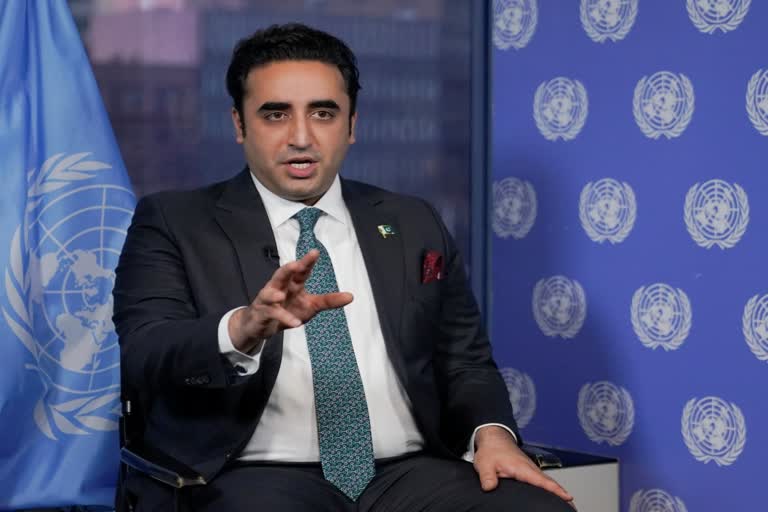UNITED NATIONS: Pakistan's foreign minister said Thursday his country is facing "a perfect storm" of troubles — an economic crisis, the consequences of catastrophic flooding, and terrorism "that is once again rearing its ugly head" as a result of the Taliban takeover of Afghanistan.
Bilawal Bhutto Zardari, the 34-year-old son of assassinated former Prime Minister Benazir Bhutto, said in a wide-ranging interview with The Associated Press that Pakistan, like other countries, is also beset by "hyper-partisan and hyper-polarized politics."
Discussing his cash-strapped country's crushing need for financial help, he sharply criticized the International Monetary Fund, which last month delayed a $6 billion bailout over Pakistan failing to meet terms of a 2019 deal. The government blames that failure on former Prime Minister Imran Khan, now the opposition leader.
The IMF gave new instructions to Pakistan to raise and collect taxes as well as slash subsidies without burdening poor people, government officials said. Zardari said his party supports expanding revenue collection and believes those who are well off should pay more, but he said Pakistan has been unable to achieve structural tax reform "for the last 23 IMF programs that we have been a part of."
"Is it really the time to nitpick about our tax policy and tax collection while we're suffering from a climate catastrophe of this scale?" he said. The IMF is not being fair to Pakistan, which is also dealing with 100,000 new refugees following the West's withdrawal from Afghanistan and "a steady uptick of terrorist activities within our country," Zardari said.
The IMF is stretching out talks on a bailout when the country needs money now to help "the poorest of the poor" whose homes and crops were washed away in the floods, he said. "And they're being told that until their tax reform is not complete, we will not conclude the IMF program."
Economically, he said, Pakistan had been able to keep its head above water despite the impact of the COVID-19 pandemic, the August 2021 Taliban seizure of power in Afghanistan, inflation and supply chain disruptions. But then last summer's floods killed 1,739 people, destroyed 2 million homes and caused $30 billion in damage — "the biggest, most devastating climate catastrophe that we've ever experienced," he said.
On the diplomatic front, Zardari said, Pakistan faces a number of challenges with its neighbors. He pointed to a host of bilateral issues with India, decades of "tragedy and conflict" in Afghanistan, and sanctions against Iran that hinder Pakistan's trade with the country.
Pakistan has "a very healthy economic relationship with our neighbor China that obviously is also in the spotlight as a result of geopolitical events," he said. The government is "very grateful" to Beijing for another $1.3 billion loan announced March 3, especially in light of the destruction of the floods, he said.
"The government of China have supported Pakistan whether by rolling over our debt or by providing economic assistance in one form or the other," Zardari said. "I am not concerned about this issue at the moment. We need help and support from wherever we can get it."
To meet its energy needs and provide relief to people paying for expensive imported fuel, he said, "we are looking to work with anyone, including Russia, to meet our energy needs." He added that he believes there is now space for imports from Russia within the U.S. price cap.
In an ideal world, Zardari said, a gas pipeline from Iran to Pakistan should be completed, but "unfortunately, I don't see that happening in the immediate future as a result of geopolitical complications." Last May, Zardari had said that the United States and Pakistan needed to move beyond past tensions over Afghanistan and enter a new engagement after years of strained relations under Khan's administration.
"We are on a healthy trajectory," he said Thursday, pointing to talks on climate, health, technology and trade. U.S. and Pakistani officials also just met to discuss counterterrorism, an issue Pakistan's government has also raised in Afghanistan, he added.
Zardari insisted Pakistan's "alleged influence over the Taliban has always been exaggerated" — before and after the fall of Kabul. He said Pakistan, however, has always maintained the importance of engagement with the Taliban on terrorism and other issues, especially women's rights to education and jobs. He was at the U.N. speaking at several meetings promoting women's rights.
Zardari said Pakistan would like to see the Taliban take action against all terrorist groups, including those linked to al-Qaida and the Islamic state. But he said there are questions about the Taliban's capacity to combat these groups because it doesn't have a standing army, a counter-terrosim force or an effective border management force.
Zardari said his advice to the West is to engage with the Taliban "regardless of what's going on on the ground." The West should also not only maintain humanitarian aid to Afghanistan but provide economic assistance to get its economy and central bank running and help Afghans from falling into an even worse economic crisis, he said.
Zardari said he understands how difficult this will be with lawmakers in the United States, United Kingdom and European Union. But without a functioning economy, he said, there won't be "space" for the Taliban to implement political decisions including trying to get them to keep prior commitments including on women's rights to education and jobs. (AP) (This story was published from an autogenerated syndicated feed and not edited by ETV Bharat staff)



